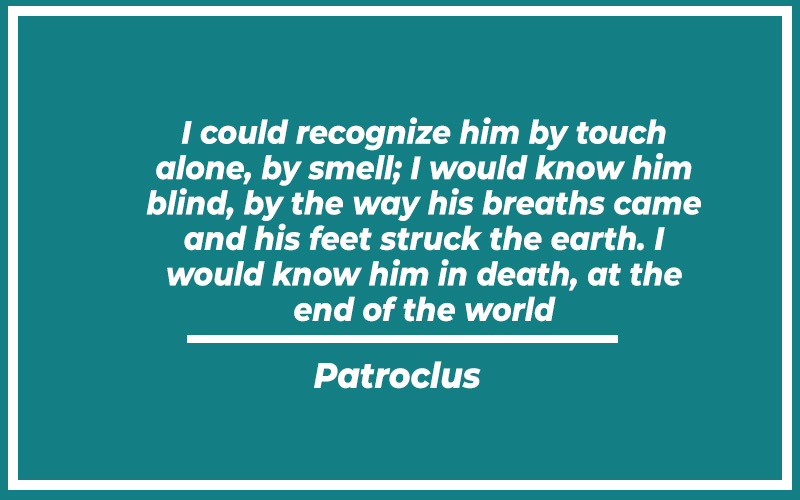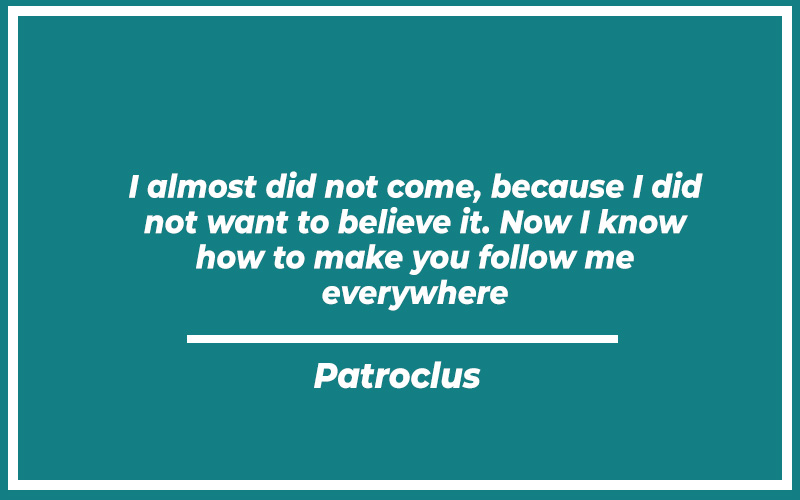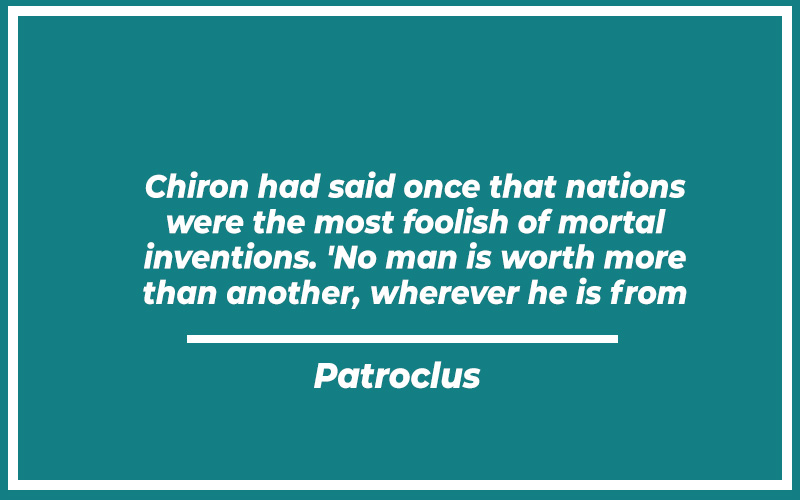The Song of Achilles by Madeline Miller isn’t your typical war story. It’s a beautiful and heartbreaking tale set against the backdrop of the Trojan War.
The novel retells the story of Achilles, the legendary Greek warrior, but through the eyes of Patroclus, his closest companion. It mainly explores themes of love, loyalty, and the devastating cost of war.
Song of Achilles Quotes

“I could recognize him by touch alone, by smell; I would know him blind, by the way his breaths came and his feet struck the earth. I would know him in death, at the end of the world.” – Patroclus
This quote highlights the deep bond between Patroclus and Achilles. Their connection transcends physical presence and sensory recognition, illustrating an intimate familiarity and unbreakable bond.
Patroclus’s ability to recognize Achilles in any form or state emphasizes their profound relationship, rooted in love and understanding.
Also Read: Life is Precious Quotes (with Explanation)
“And perhaps it is the greater grief, after all, to be left on earth when another is gone.” – Chiron
Chiron reflects on the sorrow of survival after the loss of a loved one. This sentiment resonates with the universal experience of grief, where continuing life without a cherished person feels more painful than death itself.
The quote underscores the depth of emotional pain associated with enduring loss and the enduring impact of those who are gone.
“I am made of memories.” – Patroclus
Patroclus’s statement encapsulates his identity being deeply intertwined with his past experiences, particularly with Achilles. This quote speaks to the idea that our memories and relationships shape who we are.
For Patroclus, memories of Achilles are integral to his being, highlighting the lasting influence of their bond.
“When he died, all things soft and beautiful and bright would be buried with him.” – Patroclus
This quote conveys the profound impact of Achilles’s death on Patroclus. It suggests that Achilles embodies all that is beautiful and joyful in Patroclus’s life.
His passing signifies the loss of all that is good, highlighting the central role Achilles plays in Patroclus’s world and the depth of his grief.
“We were like gods at the dawning of the world, & our joy was so bright we could see nothing else but the other.” – Patroclus
Patroclus reminisces about the early days of his relationship with Achilles, characterized by an almost divine happiness. Their joy was so overwhelming that it eclipsed everything else.
This quote illustrates the intensity and purity of their love, likening it to the mythic and timeless nature of gods.
“He is a weapon, a killer. Do not forget it. You can use a spear as a walking stick, but that will not change its nature.” – Chiron
Chiron’s warning about Achilles underscores his dual nature as both a beloved companion and a formidable warrior.
This quote emphasizes the inherent danger and lethal capability within Achilles, reminding that despite any gentleness or love, his essence remains that of a warrior.
“I would know him in death, at the end of the world.” – Patroclus
Reiterating the depth of his connection to Achilles, Patroclus emphasizes that even death or the apocalypse would not diminish his recognition of Achilles.
This quote underscores the eternal and unbreakable bond between them, transcending life and death, time, and space.
“This was a man who moved like the gods were watching—every gesture he made was upright and correct. There was no one else it could be but Hector.” – Patroclus
Patroclus’s observation of Hector emphasizes his exceptional skill and presence on the battlefield. Describing him as moving as if under divine scrutiny elevates Hector to a near-mythical status, reflecting the high regard in which he is held.
This quote highlights the awe and respect Patroclus feels for Hector, acknowledging his prowess and the inevitability of their fateful encounters. It underscores the epic nature of their conflict, with Hector standing out as a paragon of heroism and honor.
“Later Achilles would play the lyre, as Chiron and I listened. My mother’s lyre. He had brought it with him.” – Patroclus
This quote captures a serene and intimate moment, contrasting the violence and turmoil of war. Achilles playing the lyre symbolizes his connection to both his mother and his gentler nature, showcasing his multifaceted personality.
The act of playing music in the presence of Chiron and Patroclus highlights the bonds of friendship and mentorship that sustain them. This scene emphasizes the importance of cultural and emotional connections, providing a respite from the harsh realities of their lives.
“An ugly man, with a face sharp like a weasel and a habit of running a flickering tongue over his lips before he speaks.” – Patroclus
Patroclus’s description of Thersites underscores the character’s physical and moral repulsiveness. The vivid imagery of a weasel-like face and a flickering tongue creates a sense of unease and distaste. This portrayal reflects the biases and judgments based on appearance that are prevalent in the narrative.
Thersites’s depiction as ugly and unpleasant serves to emphasize the contrast between him and the more heroic and noble figures in the story, reinforcing themes of honor and aesthetics.

“I almost did not come, because I did not want to believe it. Now I know how to make you follow me everywhere.” – Patroclus
This quote reveals the depth of Achilles’s influence over Patroclus. The reluctance to accept a painful reality and the acknowledgment of being led by love highlight the complexities of their relationship. It speaks to the power dynamics and emotional dependence between them, with Patroclus willing to follow Achilles even against his better judgment.
This dynamic showcases the compelling nature of their bond, where love and loyalty drive them to extraordinary lengths.
“It was enough to watch him win, to see the soles of his feet flashing as they kicked up sand, or the rise and fall of his shoulders as he pulled through the salt. It was enough.” – Patroclus
Patroclus finds profound satisfaction in witnessing Achilles’s victories and physical prowess. This quote illustrates his admiration and vicarious joy in Achilles’s accomplishments. The imagery of flashing feet and the rhythm of his movements convey a sense of grace and power.
Patroclus’s contentment in merely observing Achilles highlights the depth of his love and the fulfillment he derives from Achilles’s success, emphasizing the selfless nature of his devotion.
“He looked different in sleep, beautiful but cold as moonlight. I found myself wishing he would wake so that I might watch the life return.” – Patroclus
In this quote, Patroclus describes Achilles in a vulnerable and ethereal state. The comparison to moonlight suggests a distant, almost unearthly beauty. Patroclus’s longing for Achilles to wake underscores his desire to see him vibrant and full of life.
This moment captures the transient nature of beauty and life, reflecting the inevitability of change and loss. It highlights Patroclus’s deep affection and the pain of witnessing the fragility of the person he loves.
“He knew, but it was not enough. The sorrow was so large it threatened to tear through my skin.” – Patroclus
This quote captures the overwhelming grief Patroclus feels. The sorrow is depicted as a physical force, almost unbearable and threatening to burst from his body. It highlights the intensity of his emotional pain, which cannot be contained or mitigated by mere knowledge or understanding.
This visceral description underscores the profound impact of loss and the deep emotional connection between Patroclus and Achilles, emphasizing how Achilles’s death leaves Patroclus in unbearable agony.
“And her skin shone luminous and impossibly pale as if it drank light from the moon.” – Patroclus
In this quote, Patroclus describes Thetis with ethereal imagery, comparing her skin to moonlight. This description elevates Thetis to an otherworldly status, emphasizing her divine nature. The luminous, pale skin suggests a supernatural beauty and presence, making her seem almost untouchable and distant.
This reinforces the idea of the gods being both awe-inspiring and intimidating, reflecting the complex relationships mortals have with divine beings in the narrative.
“Odysseus inclines his head. ‘True. But fame is a strange thing. Some men gain glory after they die, while others fade. What is admired in one generation is abhorred in another.’” – Patroclus
Odysseus’s reflection on fame offers a philosophical insight into the transient nature of glory. This quote underscores the unpredictability of how individuals are remembered, suggesting that fame is not a reliable measure of worth.
The idea that what is celebrated in one era can be despised in another highlights the changing values and perspectives over time. Odysseus’s pragmatic view contrasts with the heroism often celebrated in the epic, providing a more nuanced understanding of legacy.
“I lay back and tried not to think of the minutes passing. Just yesterday we had a wealth of them. Now, each one was a drop of heartsblood lost.” – Patroclus
Patroclus’s contemplation of time reveals the preciousness of each moment in the face of impending loss. The shift from abundance to scarcity in his perception of time underscores the urgency and poignancy of their situation.
Comparing each minute to a drop of heartsblood lost emphasizes the deep emotional toll and the sense of life slipping away. This quote poignantly captures the bittersweet awareness of mortality and the desire to hold onto fleeting moments with a loved one.
“I stopped watching for ridicule, the scorpion’s tail hidden in his words. He said what he meant; he was like a king.” – Patroclus
Patroclus reflects on Achilles’s straightforward and noble character. The comparison to a king suggests a regal and admirable quality in Achilles’s honesty and directness. By ceasing to anticipate hidden barbs in Achilles’s words, Patroclus acknowledges the trust and respect he has for him.
This quote highlights Achilles’s integrity and the clarity of his intentions, contrasting with the deceit and manipulation often present in others, and underscores the pure and honorable nature of his character.
“We were like gods at the dawning of the world, & our joy was so bright we could see nothing else but the other.” – Patroclus
Patroclus reminisces about the idyllic and almost divine nature of their early relationship. The comparison to gods and the dawning of the world suggests a time of purity, innocence, and boundless joy.
Their love is depicted as so intense and radiant that it eclipses everything else, creating a world where only they exist. This quote captures the idealized and transcendent nature of their bond, emphasizing the profound and all-encompassing happiness they once shared.
“I will go,” he said. “I will go to Troy.” – Achilles
Achilles’s declaration to go to Troy marks a pivotal moment in the narrative, signifying his acceptance of his fate and the heroic path he must follow. The simplicity and determination in his words reflect his commitment and the inevitability of his destiny.
This decision sets in motion the events that lead to his eventual glory and tragedy, underscoring the themes of honor, duty, and the inescapable nature of fate in the epic.
“We reached for each other, and I thought of how many nights I had lain awake loving him in silence.” – Patroclus
This quote captures the unspoken love and longing Patroclus feels for Achilles. The nights of silent love highlight the depth of his emotions and the restraint he has maintained. It also reflects the pain and beauty of unexpressed love, where the intensity of feeling is matched by the agony of keeping it hidden.
Patroclus’s yearning is a testament to the profound and enduring nature of his affection for Achilles.
“Achilles’ eyes were bright in the firelight, his face drawn sharply by the flickering shadows.” – Patroclus
In this quote, Patroclus describes Achilles with vivid imagery, highlighting his striking appearance and the intensity of his presence. The firelight and shadows create a dramatic contrast, emphasizing Achilles’s almost otherworldly aura.
This portrayal underscores the perception of Achilles as a figure of great beauty and power, whose presence commands attention and awe. It also reflects Patroclus’s admiration and the almost mythical status Achilles holds in his eyes.
“He smiled, and his face was like the sun.” – Patroclus
This simple yet powerful description conveys the warmth and brilliance of Achilles’s smile. Comparing his face to the sun illustrates the life-giving and radiant nature of his presence in Patroclus’s life.
It signifies how Achilles’s joy and light are central to Patroclus’s happiness, painting a picture of a love that is as vital and illuminating as the sun itself.
“This is how I think of us, when I remember our nights at Troy: Achilles and I beside each other, Phoinix smiling and Automedon stuttering through the punch lines of jokes, and Briseis with her secret eyes and quick, spilling laughter.” – Patroclus
Patroclus’s recollection of their time at Troy is filled with warmth and camaraderie. This quote paints a vivid picture of intimate moments shared with friends, filled with laughter and companionship.
It highlights the humanity and personal connections amidst the backdrop of war, showcasing the moments of joy and normalcy that sustain them.
“He is half of my soul, as the poets say.” – Patroclus
This quote underscores the profound connection between Patroclus and Achilles, likening it to the poetic notion of soulmates. Patroclus sees Achilles as an integral part of his very being, suggesting that their bond goes beyond friendship or love to something more spiritual and essential.
This statement emphasizes the depth of their relationship and the sense of incompleteness Patroclus would feel without Achilles, reflecting the ultimate unity of their souls.
“I conjure the boy I knew. Achilles, grinning as the figs blur in his hands. His green eyes laughing into mine. Catch, he says. Achilles, outlined against the sky, hanging from a branch over the river.” – Patroclus
In this nostalgic reflection, Patroclus recalls a youthful and carefree Achilles. The imagery of blurred figs, green eyes laughing, and Achilles hanging from a branch evokes a sense of innocence and joy from their past.
It contrasts with the heavier themes of war and destiny in their later lives, highlighting the simplicity and happiness of their early days together. This memory serves as a poignant reminder of their bond and the joy they once shared.

“Chiron had said once that nations were the most foolish of mortal inventions. ‘No man is worth more than another, wherever he is from.’” – Patroclus
Chiron’s wisdom, as recounted by Patroclus, offers a powerful critique of nationalism and the arbitrary divisions it creates among people. This quote challenges the idea of inherent worth based on nationality, advocating for the equality of all individuals.
Chiron’s perspective reflects a broader, more philosophical view of humanity, emphasizing universal equality and the foolishness of human constructs that divide and devalue people. This insight is particularly relevant in the context of the epic, where characters are often judged by their lineage and homeland.
Also Read: Funny Saturday Quotes (with Explanation)
Final Thoughts
Miller’s words don’t shy away from the harsh realities of battle, but they also celebrate the beauty and importance of human connection.
So, whether you’re seeking a love story for the ages or a thought-provoking reflection on war and its consequences, “The Song of Achilles” should be your go-to book.

